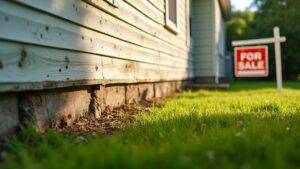Selling a house with mold can be tough in Virginia. Many buyers fear health risks and expensive repairs. If not handled well, mold can lower your home’s value and make it harder to find interested buyers.
Mold problems often signal bigger issues, like water damage or poor maintenance. Buyers might worry about hidden costs and future trouble. These concerns can lead to fewer offers or stalled negotiations.
You can sell a house with mold in Virginia by being honest, making repairs, and following state laws. Proper steps help you protect your interests and keep buyers interested.
Smart planning can turn a mold problem into a successful sale. This blog will guide you through every step to solve your mold issue and sell your house.
Key Takeaways
- Disclose all known mold issues and repairs to buyers as required by Virginia law to avoid legal and financial consequences.
- Obtain a professional mold inspection and keep detailed documentation of findings and any remediation work completed.
- Address mold problems through proper remediation or repairs, or choose to sell the property “as-is” at a lower price.
- Clearly communicate the mold situation and show repair records to build buyer confidence and facilitate a smoother sale.
- Price the home competitively, stage it well, and highlight transparency in listings to attract serious buyers despite mold concerns.
Understanding Mold and Its Impact on Home Sales
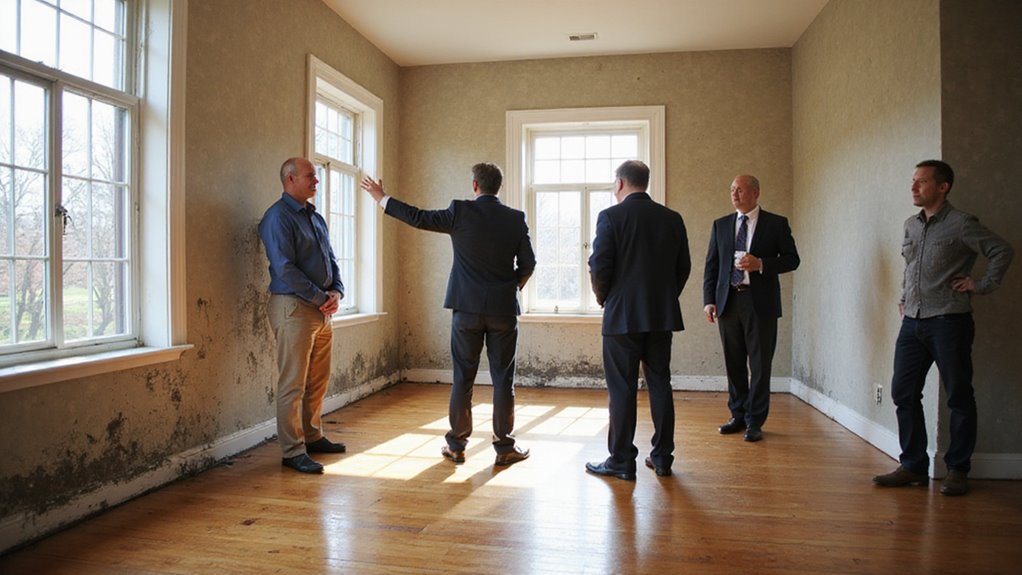
Mold can make it harder to sell your home. Buyers often avoid homes with mold because it shows possible problems and health risks. Even small mold issues can lower your home’s value.
Sellers should make mold prevention a priority. Regular inspections and fast repairs help keep your home in good condition. If you find mold, hire a professional to fix it. Professional inspections and remediation also ensure you address hidden damage that can otherwise lower property value and delay the sales process.
Keep records of all repairs and cleaning. These documents can make buyers feel more confident. If you take these steps, you can protect your home’s value and sell more easily. In Virginia, sellers are legally required to disclose known mold issues to buyers, making honesty and proper documentation key to a smooth sale.
Common Causes of Mold in Virginia Homes
In Virginia, you’ll often find mold caused by high humidity, poor ventilation, and water leaks or flooding. According to the EPA, moisture problems are the leading factor in over 50% of mold cases nationwide. By identifying and addressing these specific issues, you can reduce mold risk and improve your home’s marketability.
It’s also important to note that water damage from heavy rains and poor drainage—common concerns for Virginia homeowners—not only contribute to mold growth but can also weaken your home’s foundation. Additionally, many homeowners choose the as-is purchase option when selling due to unresolved mold issues and structural concerns, streamlining the sale process without repairs.
Humidity and Poor Ventilation
Humidity and poor ventilation help mold grow in Virginia homes. Mold thrives when indoor humidity is above 60%. Proper ventilation and lower humidity can prevent this problem.
Dehumidifiers help keep indoor humidity between 30% and 50%. Good air flow in bathrooms, basements, and attics is important. Exhaust fans or open windows can quickly improve ventilation.
Regular maintenance reduces mold risks. You should clean vents, change HVAC filters, and check crawl spaces often. If you control humidity and increase ventilation, your home becomes safer and more appealing to buyers.
Water Leaks and Flooding
Water leaks and flooding can quickly cause mold in Virginia homes. You should fix these problems right away to protect your home’s value. Mold can start to grow within 24 to 48 hours if moisture is present.
Repair any leaks in the roof, plumbing, or foundation as soon as you find them. After a flood, remove standing water and dry the area with fans and dehumidifiers. If you act fast, you can prevent mold growth.
Always check for hidden leaks behind walls or under floors during your inspection. Keep records and receipts of all repairs. Buyers may ask for proof that you handled water damage correctly.
If you manage leaks and flooding early, your home will be safer and more attractive to buyers. This also helps you follow Virginia’s disclosure laws.
Recognizing the Signs of Mold in Your Property
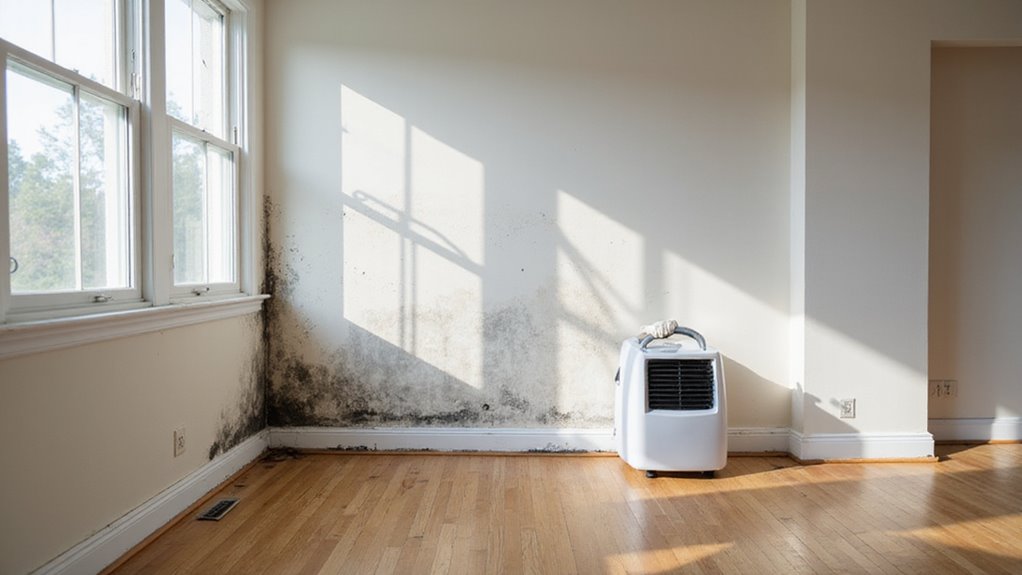
You’ll spot mold most easily as black, green, or white patches on walls, ceilings, or around windows. Don’t overlook hidden signs like musty odors, peeling paint, or unexplained allergy symptoms—these often signal mold behind surfaces. Catching these indicators early lets you address problems before they impact your sale.
Improving your home’s curb appeal is also crucial, as a well-maintained exterior can help offset buyer concerns related to interior issues like mold. In Virginia, being aware of property condition and addressing issues promptly can help your home sell faster, even when dealing with mold challenges.
Common Visual Mold Indicators
You can spot mold early by looking for clear visual signs in your home. Early detection helps you act fast and protect your health. Mold can lower your property value if ignored.
Common signs include dark spots or patches on walls, ceilings, or windows. You may notice green, black, brown, or white fuzzy areas. Peeling paint or wallpaper often means moisture is trapped underneath.
Water stains that do not dry could signal a problem. Warped or bubbling surfaces, especially in bathrooms or basements, are also warning signs. If you see any of these, consider taking action quickly.
Ignoring these signs could lead to costly repairs later. Early mold removal can make selling your Virginia home easier. Regular checks help prevent mold and protect your family.
Hidden Mold Warning Signs
Hidden mold can be present even in clean, well-kept homes. It often grows in places you cannot easily see, like behind walls or under carpets. If you want to protect your home, you must spot early warning signs.
A musty smell in a room may mean mold is hiding nearby. If you notice peeling paint or warped walls, there might be water damage and mold. Anyone experiencing more allergies indoors could be reacting to mold spores in the air.
You should check areas with high humidity, especially if repairs did not use mold-resistant materials. If you find any of these signs, consider a professional inspection. Finding mold early helps avoid costly repairs and reassures buyers during home sales.
Legal Obligations for Sellers Regarding Mold Disclosure
Sellers must tell buyers about any known mold problems in the home. This is required by state and federal laws. If you do not disclose mold, you could face legal trouble.
Buyers may cancel the sale if they find hidden mold later. Lawsuits can happen if buyers feel misled. These lawsuits may result in expensive repairs or settlements. In some situations, failing to disclose mold is similar to hiding other property liens, which must also be addressed before a sale according to Virginia law.
If mold is kept secret, your home’s value can drop quickly. Disclosure helps show you are honest and open. You also protect your home’s reputation for future sales.
If you document and share any mold issues, you reduce your risk. The Environmental Protection Agency warns that undisclosed mold can cause contract problems. Always communicate clearly about mold to avoid these risks.
Virginia law also requires careful identification of all heirs during probate sales to protect legal rights and ensure proper property transfer if a sale occurs as part of an estate.
Virginia’s Disclosure Laws Explained
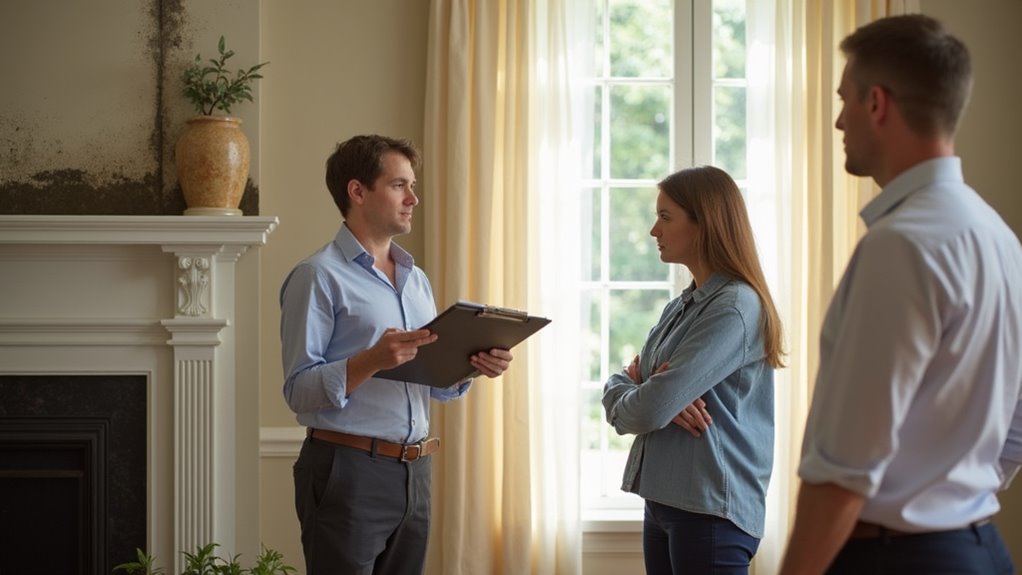
Virginia law does not require sellers to specifically disclose mold problems. Sellers must give buyers a “Residential Property Disclosure Statement.” This puts the responsibility on buyers to find mold during the inspection period.
Sellers cannot hide mold issues on purpose. If they do, they could face legal trouble. The Virginia Department of Health warns that mold can lower a home’s value. Sellers who are upfront and provide proper preparation for the transaction can help avoid legal and financial issues.
If you have fixed mold problems, keep records of what you did. These records can help avoid disagreements with buyers. Clear documentation may also make buyers feel more confident.
Being honest and proactive can lead to an easier sale. If buyers see you took care of mold, they may trust you more. Good records protect both the seller and the buyer.
In Virginia, sellers are also required to follow strict state disclosure laws regarding any material defects, which means intentionally concealing mold or related repairs could lead to legal consequences.
Getting a Professional Mold Inspection
You need to hire a certified mold inspector to ensure a thorough, credible assessment of your property. Look for professionals with industry-recognized credentials, as their reports carry more weight with buyers and agents. Understanding the inspection report’s findings will help you address issues strategically and disclose them accurately.
In Virginia, proper documentation, such as inspection reports and disclosure forms, is critical for legal compliance during the sale process. If your home has significant mold issues, some buyers offer fast cash offers for properties in any condition, allowing you to sell without making costly repairs.
Choosing Certified Mold Inspectors
Certified mold inspectors are important when selling a house. They help protect your property value and the health of everyone inside. If you want a smooth sale, you should hire a certified professional.
You should choose an inspector with strong credentials and real experience. Certified inspectors can find hidden mold using special tools. They help prevent surprises during negotiations.
Check for certifications from groups like ACAC or IICRC. Good inspectors have positive reviews and references. If you want reliable results, choose someone who uses modern testing methods.
A knowledgeable inspector knows Virginia’s rules about mold. Their inspection process should be clear and detailed. If you pick the right expert, you protect your property and peace of mind.
Understanding Inspection Reports
An inspection report is an important document after a certified mold inspector checks your home. It lists the types of mold found, their amounts, and the exact locations in your house. The report is based on air tests, surface tests, and checking for moisture.
Sellers should read the report to understand the mold problem in detail. This helps meet Virginia’s legal rules for telling buyers about issues. If mold is found, the report can guide repairs or help you talk with buyers about fixing them.
Buyers trust reports that are clear and based on facts. A complete report can make selling your home easier and faster. If all issues are addressed, it improves your chances of a smooth and legal sale.
Assessing the Severity of Mold Damage
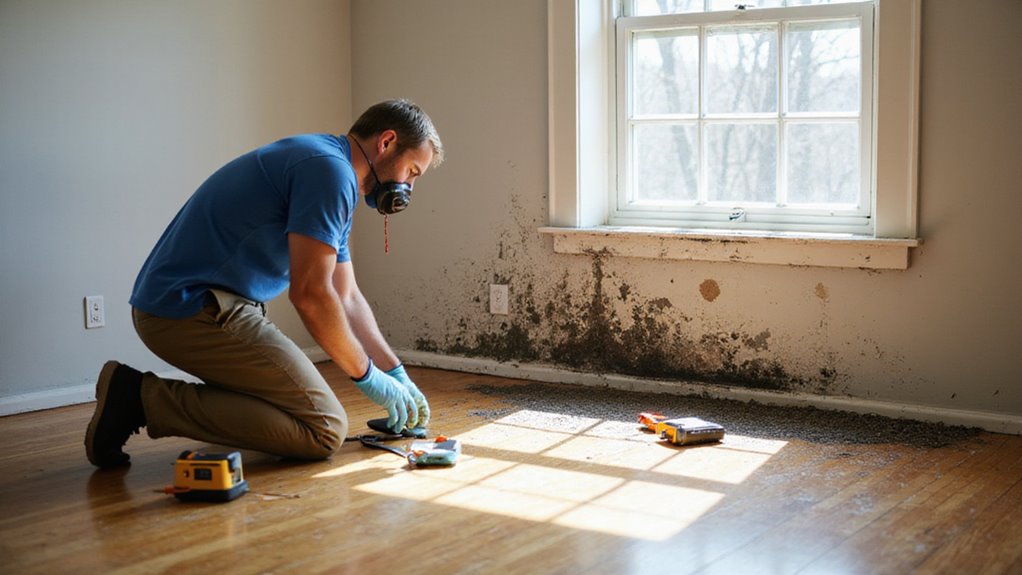
Assessing the severity of mold damage means finding out how much mold is in your home. This step is important before you sell your house. It helps you know what repairs or actions are needed.
Assessing mold damage shows how much mold is present and guides you on the repairs needed before selling your home.
Mold can lower your property value by up to 30%. It can also harm air quality and damage your home’s structure. If you find mold early, you can reduce repair costs and prevent more problems. Cosmetic flaws like surface scratches or faded paint are less critical than issues like mold, which should take priority when selling as-is.
You should look for signs like musty smells in rooms or visible mold on walls and ceilings. Water stains and peeling paint can mean hidden mold. If people in the home have more allergy symptoms, this could also be a sign.
If your home had water leaks or is very humid, check for mold right away. Prompt assessment helps you decide the best way to fix the problem. This protects your investment and the environment. Addressing property condition concerns early will make your home more appealing to buyers, helping you avoid hesitation and skepticism in the sale process.
Options for Mold Remediation
After finding mold, you have a few ways to fix the problem. You must first stop the moisture that causes mold. If you skip this, mold will return.
You can clean small mold spots yourself with soap and water. This works if the mold covers less than 10 square feet. Use gloves and a mask for safety.
If mold is on a larger area, hire a certified professional. Professionals use special tools and follow safety rules. These methods include HEPA vacuuming, negative air pressure, and antimicrobial sprays.
Choosing the right solution helps protect your home’s value. If you handle mold properly, buyers will see you care for your property. This can make your home more appealing in Virginia.
Working with a certified professional also ensures that all documentation accuracy is maintained during the sale process, which can reduce potential issues at closing.
Estimating the Cost of Mold Removal
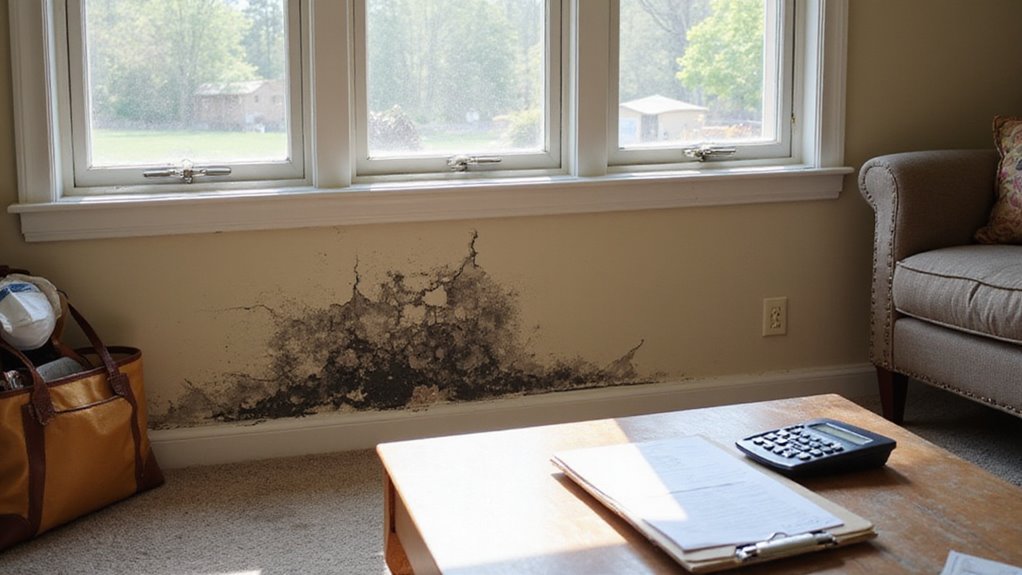
Knowing the cost of mold removal helps you plan your next steps. Professional mold remediation in Virginia costs between $500 and $6,000. The price depends on the area size, damage, and needed prevention steps.
Mold testing is often the first step and usually costs $200 to $600. You may need this to check how much mold is present. Do not forget to include this in your budget.
Unexpected costs can cause stress if you are selling your home. If test results show mold, buyers might lose interest. Tight timelines and added repairs can also strain your budget.
If you want a smoother sale, address mold concerns early. Planning for these costs can help you avoid surprises. Buyers may feel more confident if you handle mold issues upfront.
Should You Fix the Mold or Sell As-Is?
You should fix the mold if you have enough money and time. This can help you sell your house for a higher price. If you cannot fix it, you can still sell, but you must be honest about the problem.
Mold removal in Virginia usually costs $1,100 to $3,400. If the mold is severe, it may cost more. Buyers today are well-informed and expect you to reveal mold issues.
Virginia law requires you to disclose mold problems to buyers. If you cannot fix the mold, show buyers what you have done to prevent it, like installing dehumidifiers. Investors may be interested in buying your house as-is.
Your choice should depend on your budget, timeline, and the local market. Fixing the mold may attract more buyers. Selling as-is is faster but often brings a lower price.
Marketing Strategies for Homes With Mold Issues
You can still sell a home with mold by using the right marketing strategies. Focus on the property’s best features and be honest about any mold issues. Addressing concerns early builds trust with buyers.
Price the home competitively, since mold usually lowers the value by 10-30%. Professional home staging can make clean areas stand out. If you show the home well, buyers may feel more confident.
Always disclose the mold and explain any actions you have taken to fix it. Use clear photos and honest descriptions in your listing. If buyers see transparency, they may feel safer making an offer.
Highlight positive emotions in your marketing. Buyers may hope for a fresh start or feel relief that issues are known. Some might see renovation potential or feel reassured by a staged home.
Negotiating With Potential Buyers
You should disclose mold problems early in the negotiation process to build trust and meet legal requirements. Data shows that upfront transparency can shorten time on market and reduce the risk of deals falling through. Consider offering repair credits, as buyers are 60% more likely to continue negotiations when they see a clear path to remediation.
Disclosing Mold Problems Early
You should tell buyers about any mold problems as soon as they show interest. Virginia law says you must share known mold issues before selling. Early disclosure helps prevent legal trouble and builds trust.
Buyers feel more comfortable when they know the truth about mold. If you are honest, buyers may worry less and trust you more. This can also help make the sale process faster and easier.
Transparency can make your home stand out in the market. If you discuss mold openly, buyers see that you have taken care of your home. Early disclosure also lets you focus on solutions, like improving insulation or preventing mold in the future.
Offering Repair Credits
Offering repair credits can help sell a home with mold problems. Buyers may be more willing to negotiate if credits are offered. This makes your home more appealing to potential buyers.
Repair credits let buyers choose their own contractors for mold removal. They can use the money for mold cleanup or for better ventilation. These solutions can help prevent future mold issues.
Homes with repair credits often sell faster. Sellers avoid cutting their asking price just to attract buyers. A real estate agent can help set a fair credit amount using local costs.
In Virginia, repair credits can make your home stand out in the market. If you offer credits, you may close your sale more quickly. This method shows buyers you are honest about your home’s condition.
Working With Real Estate Agents Experienced in Mold Sales
Working with real estate agents experienced in mold sales makes the selling process easier and safer for you. These agents know how mold affects home value and buyer interest. They understand how to market a home with mold issues to the right buyers.
Experienced agents can help you set a fair price using market data. They may suggest ways to stage your home to reduce the impact of mold. If you follow their advice, you could attract buyers who want a project.
The right agent can address buyer concerns and improve your home’s image in the neighborhood. Agents can also help you avoid mistakes that might lead to lower offers. If you choose a mold-savvy agent, you can sell your home with more confidence.
Protecting Yourself From Liability During and After the Sale
To protect yourself from liability, you must follow Virginia law and disclose any known mold problems. If you fail to do this, buyers may take legal action. Always provide inspection reports and records of any mold cleanup.
Sellers should share mold prevention tips and explain how to keep the home dry. The EPA says that fixing leaks and controlling moisture can lower mold risks by half. Giving buyers this information shows you are acting in good faith.
A mold addendum in the sales contract can clarify the home’s condition and your responsibilities. This document can help limit your future liability. Being open and providing details helps protect you during and after the sale.
Conclusion
If you need to sell a house with mold in Virginia, it is important to know your options. If you disclose mold issues and consider remediation, you can gain buyer trust and possibly sell faster. If you choose not to address the problem, you may risk legal trouble and longer time on the market.
If you want a quick and hassle-free sale, you can consider selling your house as-is. We buy houses for cash in any condition, including those with mold problems. If you work with experienced professionals, you can avoid stress and uncertainty.
If you are ready to move forward, we at Align Real Estate Solutions can help. If you reach out to us today, we can provide a fair cash offer and guide you through the process. Let us help you turn your property challenge into a simple solution.
Author
-

Zach Koops is co-founder and Real Estate Success Manager at Align Real Estate Solutions, serving homeowners across Virginia since 2024. With a passion for real estate and a heart for people, Zach has built his career around helping sellers navigate tough situations—foreclosure, inheritance, relocation, repair-overload—with clarity and compassion. He’s known for being straightforward, steady under pressure, and deeply invested in relationships. Outside of work, he spends his time as a husband and father, enjoys the outdoors in Shenandoah Valley, loves singing on stage, and constantly seeks growth through reading and new experiences.






